catch22美国文学选读
英语毕业论文第二十二条军规赏析AnExistentialAnalysisofCatch22

An Existential Analysis of Catch-22ContentsAcknowledgements......................................................................................... . (i)Abstract(English)........................................................................................... .. (ii)Abstract(Chinese).......................................................................................... .. (iii)1. Introduction.................................................................................................. .. (1)1.1Catch-22.......................................................................................................... (1)1.2 WritingBackground ..............................................................................................12. TheExistentialism…........................................................................................... (2)2.1 “I think, so I a m” and “e xistence beforeessence” (2)2.2 The initiative of the soldiers (3)3. FreeChoice ......................................................................................................... (4)3.1 Orr................................................................................................................... . (5)3.2Yossarian ......................................................................................................... (6)4. The Absurdity of theWorld (7)4.1 The Absolute power of the Bureaucracy (7)4.2 The Moral Insanity (8)4.3 The Inevitability of Death (9)5.Conclusion .................................................................................................... (10)WorkCited.............................................................................................................. (12)AbstractThis paper is going to talk about the existentialism in Joseph Heller’s masterpiece Catch-22. As regards to the influence of existentialism on literature, Jean Paul Sartre’s theories are the one of the great significance, which is the main concern in this thesis.Joseph Heller (1923-1999) is one of the most representative writers of Black Humor, which forecasts the dominating of American post-modernism literature. The heart of Black Humor is the description of the absurdity of the world, which is also a doctrine of existentialism. So it is said that existentialism is one of the origins of Black Humor.In Catch-22, there are bounds of freedom and the struggles to get off from them, which is a main theme of the book. And as regard to Sartre’s existentialism, the central thought is the freedom to choose what one wants to be or to do, which agrees with the theme of Catch-22 above I have mentioned. So in this paper I just choose Sartre’s existentialist thoughts to analyze it, despite other existentialists. Existentialism is a different point of view to look at the traditional war-novel, from which I think a deeper and more theoretical criticism of the war as well as that of the world can be obtained.For the value of this paper, first of all, it will prove Catch-22 an existential novel. Both centered on the theme of freedom, this novel and existentialism share the same basis, so it’s natural to connect them together. Also, there is chapter four on absurdity to illustrate this point. Thirdly, I want to stress the subjectivity and advantages of existentialism. Although many people think it assuperficial and spiritual, it stresses on humanism, paying attention to initiative and subjectivity, which are still hot centers of discussion till now.Key words: Catch-22;Existentialism; Free choice; Absurdity内容摘要约瑟夫·海勒的代表作《二十二条军规》中渗透着存在主义的思想,这也是本论文讨论的主旨所在。
The Book Report catch22 《第二十二条军规》读书报告
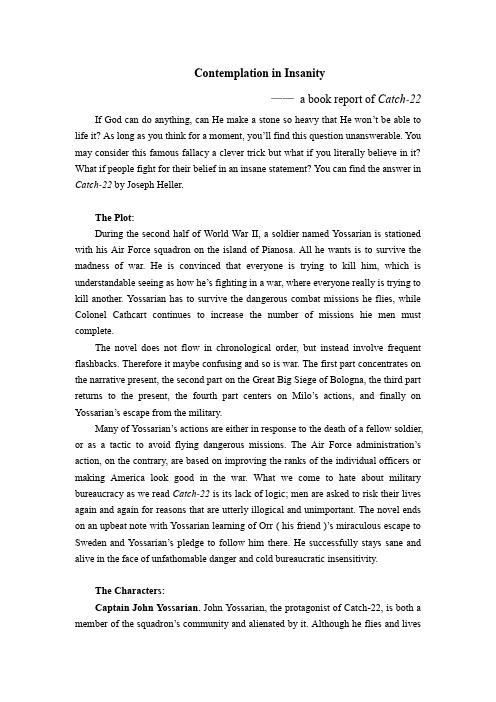
Contemplation in Insanity——a book report of Catch-22 If God can do anything, can He make a stone so heavy that He won’t be able to life it? As long as you think for a moment, you’ll find this question unanswerable. You may consider this famous fallacy a clever trick but what if you literally believe in it? What if people fight for their belief in an insane statement? You can find the answer in Catch-22 by Joseph Heller.The Plot:During the second half of World War II, a soldier named Yossarian is stationed with his Air Force squadron on the island of Pianosa. All he wants is to survive the madness of war. He is convinced that everyone is trying to kill him, which is understandable seeing as how he’s fighting in a war, where everyone really is trying to kill another. Yossarian has to survive the dangerous combat missions he flies, while Colonel Cathcart continues to increase the number of missions hie men must complete.The novel does not flow in chronological order, but instead involve frequent flashbacks. Therefore it maybe confusing and so is war. The first part concentrates on the narrative present, the second part on the Great Big Siege of Bologna, the third part returns to the present, the fourth part centers on Milo’s actions, and finally on Yossarian’s escape from the military.Many of Yossarian’s actions are either in response to the death of a fellow soldier, or as a tactic to avoid flying dangerous missions. The Air Force administration’s action, on the contrary, are based on improving the ranks of the individual officers or making America look good in the war. What we come to hate about military bureaucracy as we read Catch-22 is its lack of logic; men are asked to risk their lives again and again for reasons that are utterly illogical and unimportant. The novel ends on an upbeat note with Yossarian learning of Orr ( his friend )’s miraculous escape to Sweden and Yossarian’s pledge to follow him there. He successfully stays sane and alive in the face of unfathomable danger and cold bureaucratic insensitivity.The Characters:Captain John Yossarian. John Yossarian, the protagonist of Catch-22, is both a member of the squadron’s community and alienated by it. Although he flies and liveswith the men, he is marked as an outsider by the fact that many of the men think he is insane. But Yossarian’s characteristics are not those of a typical hero. He does not risk his life to save others; in fact, his primary goal throughout the novel is to avoid risking his life whenever possible. Maybe it is because that the system of values around Yossarian is so skewed that this approach seems to be the only truly moral stance he can take, if only because it is so logical. In a world where life itself is so undervalued and so casually lost, it is possible to redefine heroism as simple self-preservation. In the end, when offered a choice between his own safety and the safety of the entire squadron, Yossarian is unable to choose himself over others. This concern for others complicates the simple logic of self-preservation, and creates its own Catch-22: life is not worth living without a moral concern for the well-being of others, but a moral concern for the well-being of others endangers one’s life.Milo Minderbinder.Representing an extreme version of capitalist free enterprise that has spiraled out of control, Milo seems simultaneously brilliant and insane. What starts out as a business in black-market eggs turns into a worldwide enterprise in which, he claims, “everyone has a share.” He lies, cheats and steals his way through the war. The Germans pay him to bomb his own base and the Americans pay him to bomb Germans. He uses military planes to fly his goods from place to place, and lives in palaces. Milo tells the men in his squadron that they all have a share of his profits, but he bombs his own squadron as part of a deal he has made with the Germans. His willingness to allow his own camp to be bombed shows his complete disregard for the sides drawn by the war, and the men’ s acceptance of payment for being bombed shows that Milo is not alone in placing a high value on making money.The Themes and Ideas:Catch-22.There’s only one catch to Yossarian’s plan to save himself, and that’s Catch-22. This passage from Chapter 5 marks the novel’s first mention of the paradoxical law called “Catch-22.”There was only one catch and that was Catch-22, which specified that a concern for one’s own safety in the face of dangers that were real and immediate was the process of a rational mind. Orr was crazy and could be grounded. All he had to do was ask; and as soon as he did, he would no longer be crazy and would have to fly more missions. Orr would be crazy to fly more missions and sane if he didn’t, but if he wassane he would have to fly them. If he flew them he was crazy and didn’t have to; but if he didn't want to he was sane and had to. Yossarian was moved very deeply by the absolute simplicity of this clause of Catch-22 and let out a respectful whistle.“That’s some catch, that Catch-22,” he observed.“It’s the best there is,” Doc Daneeka agreed.The more Yossarian learns about Catch-22, though, the bigger it grows, each new clause as infuriating and paradoxical as the last. Catch-22, we learn, is the Bible of bureaucracy — every pointless and petty regulation made by someone who has never seen a battlefield to make themselves look good with no sleep lost for the people like Yossarian who get killed in the process.There’s no reasoning or arguing with Catch-22. It’s not personal. It’s just the rules, and if the rules say that Yossarian has to die, then that’s what Yossarian has to do.Over the course of the novel, Catch-22 is described in a number of different ways that can be applied to a number of different aspects of wartime life; here, however, Catch-22 affects Yossarian most specifically. Catch-22 is alarmingly persuasive; even Yossarian accepts what seems to be its logical infallibility. But Catch-22 is an abstract thing; we find out later that Yossarian believes that Catch-22 does not really exist. It is a trap made up of words, and words are faulty things, often misrepresenting reality. What is so upsetting about the way Catch-22 is applied throughout the novel is that real men are sent into real peril based on a few unreal and unreliable words. The the pointlessness of the fact makes Yossarian crazy.Personality in the insane world.Unlike other anti-romantic war novels, Catch-22relies heavily on humor to convey the insanity of war, presenting the horrible meaninglessness of armed conflict through a kind of desperate absurdity rather than through graphic depictions of suffering and violence. Catch-22also distinguishes itself from other anti-romantic war novels through its core values: the story of Yossarian, the protagonist, is ultimately not one of despair but one of hope. He believes that the positive urge to live and to be free can redeem the individual from the dehumanizing machinery of war. The novel is told as a series of loosely related, tangential stories in no particular chronological order. The narrative that emerges from this structural tangle upholds the value of the individual in the face of the impersonal, collective military mass; at every stage it mocks insincerity and hypocrisy, even when such values appear triumphant.Despite its World War II setting, Catch-22is often thought of as a signaturenovel of the 1960s and 1970s. It was during those decades that American youth truly began to question authority. Hippies, university protests, and the civil rights movement all marked the 1960s as a decade of revolution, and Heller’s novel fit in perfectly with the spirit of the times. In fact, Heller once said, “I wasn’t interested in the war in Catch-22. I was interested in the personal relationships in bureaucratic authority.” Whether Heller was using the war to comment on authority or using bureaucracy as a statement about the war, it is clear that Catch-22 is more than just a war novel. It is also a novel about the moral choices that every person must make when faced with a system of authority whose rules are both immoral and illogical. This reminds me the dark ten years of the Great Proletarian Cultural Revolution. Millions of people were persecuted and suffered a wide range of abuses and millions of people became insane illogical, which makes the perseverance of personal principles more valuable and remarkable.Reference:[1]约瑟夫·海勒.第二十二条军规[M].南京: 译林出版社.[2]常文革.黑色幽默的典范[N].长春师范学院学报,2005-9。
美国文学 Catch-22
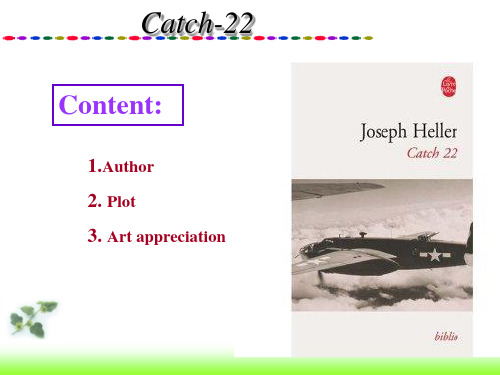
Plot
“the ancestor of black humor ”
The story takes place on an island in the Mediterranean(地中海) and the end of the second world war, American a squadron stationed on the island. As general provisions, fly full specified number (first 25) as the pilot of the plane can be returned, but the catch is, in fact, no matter when, must execute the commander ordered to do. Squadron commander Keith colonel colonel, carter is a empleomania, he again to increase mission, far beyond the general rules. The pilots have phobias, become crazy.
Catch-22 is a radical protest novel(激进的抗议小 说),protest against the existing power centers in the United States.
New term
The English name of the novel "Catch - 22" has entered the English dictionary, become a common English vocabulary. It represents the rulers to fool the people, also on behalf of the people for the ruler.
CATCH-22 陷阱(2016-5-10)

【Catch-22 】陷阱- 刘宁-最近的VOA有一篇关于银行质押买房的文章,文中遇到一个名词"Catch-22",词义解释为困境,颇感新鲜。
经查阅,方知“Catch-22”源自于美国的一部讽刺性的长篇小说,后拍成电影。
充满黑色幽默的故事,演绎了处于这种"Catch-22"陷阱的可怜的人们百般无奈。
很有意思,特剪出部分精华和体会与大家分享。
Catch-22 means A situation in which a desired outcome or solution is impossible to attain because of a set of inherently illogical rules or conditions。
该词用来形容“由于自相矛盾/不合逻辑的政策或规定导致人们处于无法摆脱的一个困境、或难以逾越的一个障碍或陷阱。
显然,它与Dilemma (困境)的含义是有区别的。
Dilemma : a situation in which a difficult choice has to be made between two or more alternatives(进退两难的困境)※故事梗概"Catch-22" 是美国作家约瑟夫·海勒讲述二战时期美国一个空军中队故事的长篇小说。
“Catch-22”是美国空军军规中的第22条,故,小说和电影中文皆译成“第22条军规”。
本书主人公是飞行中队的上尉轰炸手。
他满怀拯救正义的热忱投入战争,立下战功,被提升为上尉。
然而他在和周围凶险环境的冲突中,亲眼目睹了那种种虚妄、荒诞、疯狂、残酷的现象后,逐渐领悟到自己是受骗了。
他变严肃诚挚为玩世不恭,从热爱战争变为厌恶战争。
他不想升官发财,也不愿无谓牺牲,他只希望早点活着回家。
围绕着如何早点离开战争,作者演绎出两段颇具黑色幽默的故事,让读者看到Catch-22军规其实就是自相矛盾的悖论,根本无法实施,最后得出结论:Catch-22 就是一个让人们无法逾越的陷阱!悖论-1:自相矛盾的上级政策和许诺 = 空话、屁话空军司令部规定,完成25次战斗飞行的人有权申请回国,但须获得上司批准。
Unit16-Catch-22
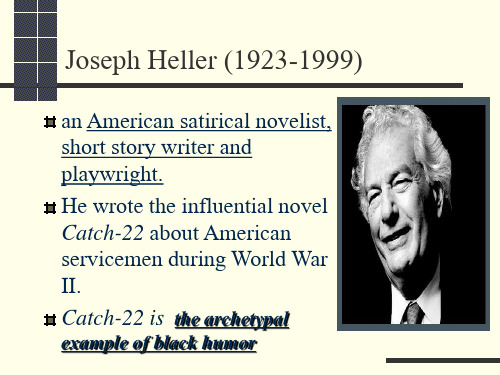
Anti-hero
• The anti-hero is also an important figure in modern drama, both in the theatre of the absurd and in the tragedies of Arthur Miller, notably Death of a Salesman (1949).
Joseph Heller (1923-1999)
an American satirical novelist, short story writer and playwright. He wrote the influential novel Catch-22 about American servicemen during World War II. Catch-22 is the archetypal
Black Humor
• In literature, drama, and film, grotesque or morbid humor used to express the absurdity, insensitivity, paradox, and cruelty of the modern world.
• Ordinary characters or situations are usually exaggerated far beyond the limits of normal satire or irony. Black humor uses devices often associated with tragedy and is sometimes equated with tragic farce.
Black Humor
catch-22 译文对比分析
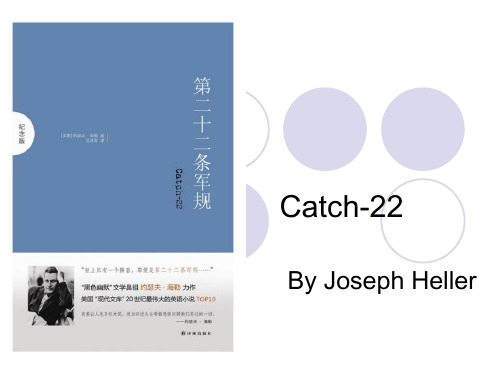
By Joseph Heller
约瑟夫· 海勒
约瑟夫•海勒(1923—1999),美国黑色幽默派和荒诞派 代表作家。二战期间曾任空军中尉,执行过60次飞行任务 ,战后入纽约大学学文学。 1948年毕业于纽约大学。1949年在哥伦比亚大学获文学硕 士学位后,曾任《时代》和《展望》等杂志编辑。他根据 自己的参战经历创作成长篇《第二十二条军规》,引起巨 大轰动,使他跻身美国一流作家之列。此外,他还著有《 出了毛病》、《像高尔德一样好》、《上帝知道》等小说 。 约瑟夫•海勒的作品上世纪80年代后译介到国内,反响巨 大,王朔、马原、王小波、刘索拉等一批作家皆受其影响 。
原文:Major Danby recited,
译本1:丹比少校一件一件地列举道 译本2:丹比少校列举道 一件一件是很明显是增译,其实 列举 肯定是一件一件,所 以一方面看的话,有一点多余或者重复,但另一方面,可 能也是为了强调。
原文:extensive black-market operations, act will swear that you and McWatt lied in your official report 译本1:阿费将宣誓作证,说你和麦克沃特在你们给上级的 报告中说了假话
译本2:阿费将宣誓作证,说你和麦克沃特在正式报告中说 了谎 译文1稍作了解释,单纯说正式报告的话,读者可能会不理 解正式报告是什么报告,正式报告有一点直译。
Major Danby drew back a bit and began mopping his forehead again.
扬、程、邹译:丹比少校往后缩了缩身体,又擦拭起额头来。
吴译:丹比少校往后缩了缩,又擦拭起额头来。
英语文化必读书单:《第二十二条军规》

这一期,看东西为大家推荐我最喜爱的西方书籍、电视节目、电影作品。
阅读这些专题文章,足不出户就可以了解时下最受海外小伙伴追捧的文娱作品,保证你在文化圈里绝不落伍。
内容概览西方世界,每个人几乎都能解释“Catch-22”的意思:深陷悖论的两难局面,终将无法达到目的,因为付诸行动就注定了你从一开始便无法采取行动。
听起来很拗口?举个例子:设想一下你必须要靠兼职打工赚钱才能完成你的学位,但任何课外打工的学生都会因忽视学业而被劝退。
此乃典型的“Catch-22”。
这个概念让人摸不着头脑,如果置身军事背景中,就演变成了约瑟夫·海勒这本黑色幽默小说的主题,同样令人费解。
故事发生在二战结束前的几个月,而小说本身似乎没有多少情节可言,更像是一系列对于航空轰炸兵和军机飞行员的群像速写。
其中,最主要的人物是约瑟连,他忿忿不平,因为很多不曾谋面的人,正企图置自己于死地。
小说背后的故事海勒自己在二战期间便是一个轰炸兵,他正是想借这本书描摹他所看到的战争的荒谬,荒谬到可笑,却又不那么可笑。
书中的人物都有着荒唐的名字,而他们的价值观和世界观则更加离谱——海勒恐怕是在白描他的亲眼所见,其笔法之精准令人叹为观止。
无论是否根植于现实,海勒笔下的人物,以及他们逃离战争恐慌的热切愿望,都与战后社会人们的真实心境共鸣,而他们也给今天的读者带来了同样的笑泪和思考。
此书妙在何处?推荐《第22条军规》,因为写的真是太尼玛逗了。
其实,这本书可能是有史以来最幽默的文学作品(在“史上顶级幽默小说排行榜”中,此书位列第二,仅次于《银河系漫游指南》)。
小说人物荒诞(比如那位不幸被命名为“梅杰·梅杰·梅杰·梅杰”的仁兄),遭逢一连串越来越荒诞的境遇,最后的结果更是让人笑破肚皮。
但是真正让“Catch-22”成为一代杰作的原因是它让你最终意识到战争并不好笑。
而为传达这一主旨,海勒的手法,唯大师可企及。
最佳阅读时机因为这部小说太长(500多页),所以正好等放假再看。
陶洁《美国文学选读》(第3版)笔记和课后习题详解(第25单元约瑟夫
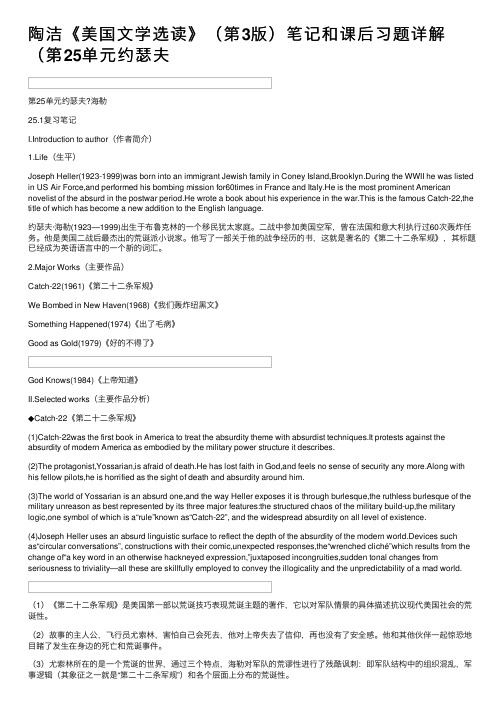
陶洁《美国⽂学选读》(第3版)笔记和课后习题详解(第25单元约瑟夫第25单元约瑟夫?海勒25.1复习笔记I.Introduction to author(作者简介)1.Life(⽣平)Joseph Heller(1923-1999)was born into an immigrant Jewish family in Coney Island,Brooklyn.During the WWII he was listed in US Air Force,and performed his bombing mission for60times in France and Italy.He is the most prominent American novelist of the absurd in the postwar period.He wrote a book about his experience in the war.This is the famous Catch-22,the title of which has become a new addition to the English language.约瑟夫·海勒(1923—1999)出⽣于布鲁克林的⼀个移民犹太家庭。
⼆战中参加美国空军,曾在法国和意⼤利执⾏过60次轰炸任务。
他是美国⼆战后最杰出的荒诞派⼩说家。
他写了⼀部关于他的战争经历的书,这就是著名的《第⼆⼗⼆条军规》,其标题已经成为英语语⾔中的⼀个新的词汇。
2.Major Works(主要作品)Catch-22(1961)《第⼆⼗⼆条军规》We Bombed in New Haven(1968)《我们轰炸纽⿊⽂》Something Happened(1974)《出了⽑病》Good as Gold(1979)《好的不得了》God Knows(1984)《上帝知道》II.Selected works(主要作品分析)◆Catch-22《第⼆⼗⼆条军规》(1)Catch-22was the first book in America to treat the absurdity theme with absurdist techniques.It protests against the absurdity of modern America as embodied by the military power structure it describes.(2)The protagonist,Yossarian,is afraid of death.He has lost faith in God,and feels no sense of security any more.Along with his fellow pilots,he is horrified as the sight of death and absurdity around him.(3)The world of Yossarian is an absurd one,and the way Heller exposes it is through burlesque,the ruthless burlesque of the military unreason as best represented by its three major features:the structured chaos of the military build-up,the military logic,one symbol of which is a“rule”known as“Catch-22”, and the widespread absurdity on all level of existence.(4)Joseph Heller uses an absurd linguistic surface to reflect the depth of the absurdity of the modern world.Devices suchas“circular conversations”, constructions with their comic,unexpected responses,the“wrenched cliché”which results from the change of“a key word in an otherwise hackneyed expression,”juxtaposed incongruities,sudden tonal changes from seriousness to triviality—all these are skillfully employed to convey the illogicality and the unpredictability of a mad world.(1)《第⼆⼗⼆条军规》是美国第⼀部以荒诞技巧表现荒诞主题的著作,它以对军队情景的具体描述抗议现代美国社会的荒诞性。
catch-22
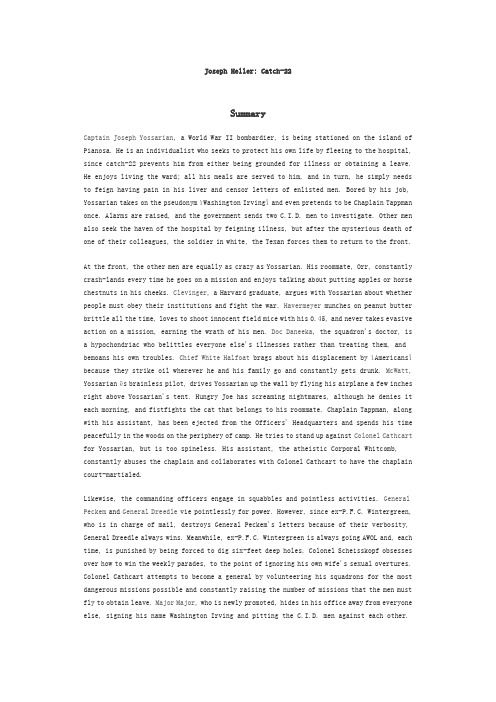
Joseph Heller: Catch-22SummaryCaptain Joseph Yossarian, a World War II bombardier, is being stationed on the island of Pianosa. He is an individualist who seeks to protect his own life by fleeing to the hospital, since catch-22 prevents him from either being grounded for illness or obtaining a leave. He enjoys living the ward; all his meals are served to him, and in turn, he simply needs to feign having pain in his liver and censor letters of enlisted men. Bored by his job, Yossarian takes on the pseudonym ìWashington Irvingî and even pretends to be Chaplain Tappman once. Alarms are raised, and the government sends two C.I.D. men to investigate. Other men also seek the haven of the hospital by feigning illness, but after the mysterious death of one of their colleagues, the soldier in white, the Texan forces them to return to the front.At the front, the other men are equally as crazy as Yossarian. His roommate, Orr, constantly crash-lands every time he goes on a mission and enjoys talking about putting apples or horse chestnuts in his cheeks. Clevinger, a Harvard graduate, argues with Yossarian about whether people must obey their institutions and fight the war. Havermeyer munches on peanut butter brittle all the time, loves to shoot innocent field mice with his 0.45, and never takes evasive action on a mission, earning the wrath of his men. Doc Daneeka, the squadron's doctor, is a hypochondriac who belittles everyone else's illnesses rather than treating them, and bemoans his own troubles. Chief White Halfoat brags about his displacement by ìAmericansî because they strike oil wherever he and his family go and constantly gets drunk. McWatt, Yossarian ës brainless pilot, drives Yossarian up the wall by flying his airplane a fe w inches right above Yossarian's tent. Hungry Joe has screaming nightmares, although he denies it each morning, and fistfights the cat that belongs to his roommate. Chaplain Tappman, along with his assistant, has been ejected from the Officers' Headquarters and spends his time peacefully in the woods on the periphery of camp. He tries to stand up against Colonel Cathcart for Yossarian, but is too spineless. His assistant, the atheistic Corporal Whitcomb, constantly abuses the chaplain and collaborates with Colonel Cathcart to have the chaplain court-martialed.Likewise, the commanding officers engage in squabbles and pointless activities. General Peckem and General Dreedle vie pointlessly for power. However, since ex-P.F.C. Wintergreen, who is in charge of mail, destroys General Peckem's letters because of their verbosity, General Dreedle always wins. Meanwhile, ex-P.F.C. Wintergreen is always going AWOL and, each time, is punished by being forced to dig six-feet deep holes. Colonel Scheisskopf obsesses over how to win the weekly parades, to the point of ignoring his own wife's sexual overtures. Colonel Cathcart attempts to become a general by volunteering his squadrons for the most dangerous missions possible and constantly raising the number of missions that the men must fly to obtain leave. Major Major, who is newly promoted, hides in his office away from everyone else, signing his name Washington Irving and pitting the C.I.D. men against each other.After the cancelled mission to Bologna, Nately, one of Yossarian's colleagues, becomes lovestruck with this whore he meets in an apartment. Aarfy and the other soldiers mock him and the whore herself rejects Nately as boring, but Nately insists that he wants to marry her. Captain Black sleeps with her each time to torment Nately. Despite this outer show of apathy, when Yossarian beats up Nately in a fury, the whore blames him and tries to beat him up. Nevertheless, shortly afterwards, Yossarian breaks the terrible news of Nately's death, and she doggedly follows him from Rome back to the camp, trying to kill him with a knife. Finally, Yossarian disposes of her by throwing her out of the back of an airplane. When he hears that her younger sister has been wrongfully driven away from Rome, he tries to find her.Perhaps the most unusual officer is Lieutenant Milo Minderbinder. He has started his own enterprise, called M&M Enterprises. He persuades everyone to join his syndicate by arguing that everyone has a share and thus profits from his work. Milo also tempts the officers with the offers of delicious food from lamb chops to fresh eggs doused in butter; in turn, he requests to . He recruits people from both sides and, since he owns the planes for both sides, also charges each side commission when he engages one enemy against the other. Milo makes a critical business error when he purchases the entire crop of Egyptian cottonóonly to discover that there is no market for it. His attempt to destroy his own crop creates widespread fury, but Milo pacifies them and instead bribes the government to purchase it off of him. At the end, Milo tries to persuade Colonel Cathcart to relieve him of the enterprise so he can fly missions like everyone else. At first, Colonel Cathcart agrees, but when he realizes how much work there is, he instead offers Milo all the planes that he wants and any medals that may result from the men being killed during the missionsThe war takes an especially harsh toll on the men and their morale. Yossarian continuously opposes the war and Colonel Cathcart's constant increase of the number of missions that are required to be able to take a leave. He argues continuously with Clevinger that everyone is trying to kill him, and that anyone who try to make him fight is just as dangerous as the enemy. Yossarian's various attempts to be grounded fail. Doc Daneeka repeatedly refuses to grant him the orders, basing his arguments on ìcatch-22.î If he is crazy, then Yossarian would be flying the missions. However, if he is not crazy and does not want to fly the missions, then he is capable of flying them and must do such. Chaplain Tappman pities Yossarian because of the latter's mentally debilitating state, and appeals to Colonel Cathcart and others to have Yossarian go home; he is too spineless, though, to be effective. Clevinger argues that the war should be fought, based on the intellectual argument that if they do not, they will lose and furthermore others will be killed in their stead because of their cowardice. Meanwhile, all the officers consider Yossarian to be crazy and merely dismiss him as a nut case.In protest against being forced to fly more than the required number of missions as designated by the Group Headquarters, Yossarian uses various strategies. At the beginning of the book, he flees to the ward and discovers what a haven it is. To prolong his stay there, he pretends to have a strange disease in which he sees everything twice. In combat, he takes evasive action during his flights to avoid being killed. He also turns back once, pretending thathis intercom is defective. When Colonel Cathcart volunteers his squadron for the dangerous Bologna mission, Yossarian moves the bombline on the map to deceive the men into thinking that it has already been captured and the air strike is called off. Despite these tactics, he cannot avoid combat entirely and is haunted by the death of his comrades. At Avignon, Snowden is killed, and Yossarian has terrible memories of his attempt to save Snowden, although . After this traumatic experience, he walks around naked, without his uniform, and watches Snowden's burial from a tree. Then, an otherwise unknown man, Mudd, is killed just two hours after his arrival and is dumped in his tent. Everyone denies the existence of Mudd, so he lies there, despite Yossarian's protests. The final straw, though, is when his dear friend, Nately, is killed at. After this, Yossarian refuses to fly any more missions.When they realize that Yossarian cannot be dissuaded, the officers try to make a deal with Yossarian that will allow him to no longer fly any missions but be ethically repulsive to him. They will send him home as long as he likes them. If he does not give in, he will be court-martialed for being involved in black market practices. Yossarian protests against such wrongful accusations, but the officers claim they are justified in jailing an innocent man to keep the war effort going. Left without any other choice, Yossarian runs away to avoid court-martialing as well as Nately's whore, who is trying to kill him to avenge Nately's death.AnalysisThe plot structure of Catch-22 is unusual in several aspects, and requires careful attention from the reader. The timeline is quite disorienting and much of it entails reminiscences of the various characters. Figures that are alluded to by other characters are often not more fully developed and explored until their appropriate chapter. Hence, much of the description and anecdotes are quite incidental, and although, they do provide a more complete picture of the character, requires the reader to sift through the material and determine what is relevant to the main plot and what is not. Despite this confusion, the reader's interest is maintained by using the plot device of foreshadowing and . Seemingly arbitrary episodes and flashbacks, such as Yossarian's traumatic recollections of Snowden's death, will become a common device for the rest of the book. The importance of the flashback of Snowden's death cannot be understated.The content of the plot touches on several crucial themes that form the groundwork for the maddening atmosphere of Pianosa. First, Yossarian constantly reiterates his right to life and using whatever means to save himself from being killed. Survival, not winning the war, is what matters to him. Also being questioned are the morals of the country. Captain Black's episode with the Glorious Loyalty Crusade points out how patriotism can be abused for someone's personal ambition or agenda. Religion is also repeatedly questioned. The chaplain himself is thrown out from the officers' headquarters and happily lives in his own world. Even he has his own doubts about God and morality, and once, when he lies, he feels so wonderful about it.The institutions that run the war and support the war, the military establishment, thegovernment, big business, and the medical institution, are also severely satirized. Perhaps the most targeted institution is the military establishment. Throughout the book, it is criticized for its bureaucracy, its inner squabbling, the absurd tactics to move up the ranks, and its absurd obsessions. Generals Peckem and Dreedle continuously squabble Colonel Cathcart constantly increases the number of missions, in an attempt to be promoted to general. The big business, represented by Milo, comes to represent a parasite that profits off of the war. This financial obsession is so bad that even Milo is willing to destroy his own squadron simply to ensure a profit. Finally, the medical institution, throughout the entire book, the doctors are presented as ignorant and presumptuous, and treat their patients without compassion, and sometimes even lack humanity. This is particularly ironic, because the traditional view of doctors is that their interest is to preserve life and to heal the sick and wounded. The representative character from this establishment is Doc Daneeka. He never listens to anyone's troubles and refuses to ground any of the men, on the grounds of the catch-22 argument.Lastly, and perhaps, most importantly, the viewpoint and logic of ìcatch-22î expose the dangers of the war. Doc Daneeka points out that the men are trapped because those who are mad will fly the missions and if they deny madness, they will be forced to fly them because they are capable of doing so. Orr turns this logic against the military bureaucracy when he begins to hope for the improbable: that he can row to Switzerland in a boat, using only an oar the size of a Dixie-cup spoon. After all, which is more likely: that he will get to Switzerland before the war ends, or that Colonel Cathcart will allow the men to take leave and return home? While ìcatch-22î is a method of rationalizing absurd ends, it lacks any common sense. Minor incidents such as the falsified theft of a plum tomato become the crucial points of evidence against the chaplain. Calamities such as the death of Nately are blown off as unimportant, because they do not serve as useful evidence in achieving the military's ends. This lack of context for the events and disproportionate viewpoint of them only underscore the horrifying lesson of the war: that rationalization (not reason) can be used for the wrong purposes when the general population does not protest against such use or lack the sense to recognize the dangers of such a technique.。
Catch-22

《第二十二条军规》是海勒的代表作,它是关于在第二次世界大战期间 一群人的生活。 故事发生在1944年,联盟军已经占领的罗马。第二十七美国空军的第256 中队驻扎在科西嘉和意大利之间的皮亚诺萨小岛上。只要条件允许, 轰炸队的成员就去法国南部和意大利的城市中。这是一个疯狂的世界。 指挥官命令他的助手只有在他出去的时候才让人来见他。卡斯卡特上 校一心只想向上爬,不断地提高战士的飞行次数。尽管上级说他们只 需要飞四十次就可以回家,但是一个叫做“第二十二条军规”的官僚圈 套却说他们不能回家,因为他们必须遵守长官的命令,但是长官不断 地提过必需的飞行任务的次数。更荒诞的是,在这样的疯狂世界上, 一些人却快乐的生活着。管理军官食堂的官员米洛把他的工作变成了 一个国际化的黑市食品辛迪加联合体。约塞连在他所检查的每封信上 都签上作家“华盛顿.欧文”的名字,而且,他连续几天都裸露着身体, 即使在他被授予奖牌的时候,他也没穿衣服。
苏联解体(1991) 海湾战争(1911反击伊拉克入侵科威特) 贫富差距极大 犯罪率上升 毒品问题 反托拉斯法 计算机技术快速发展 政府权力滥用:水门事件
此外,在弗拉拉、博洛尼亚和阿维尼翁飞行任务期间, 许多人在罗马的公寓房间里与妓女厮混着。 但是,死亡围绕着他们。一些人死了,因为高射炮射中 了他们的飞机,如斯诺登、马德和内特利。每当恐怖威 胁使约塞连痛不欲生的时候,他就编出某个症状,让他 住进医院。约塞连多次试图被诊断为十足的疯子,以为 这样他就能退伍。他的指挥官变得恼怒无比,最后,他 们提出,如果约塞连赞美他们,他们就把约塞连当作一 名英雄一样遣返回国。但是,约塞连拒绝了。当奥尔安 全抵达中立国瑞典的消息传到皮亚诺萨小岛,约塞连正 处在麻烦之中。他拒绝了英雄交易;大多数他的朋友都 死了;他害怕下一个飞行任务会杀死他;他还被一位试 图杀害他的妇女追逐,因为她责备他,要他为她丈夫的 死负责任。约塞连看见除了和奥尔一样选择安全和理性 别无它路,他也跑到了瑞典。
catch 22

Catch-22 is a satirical, historical novel by the American author Joseph Heller, first
published in 1961.
Among other things, Catch-22 is a general critique of bureaucratic operation and reasoning.
In Heller's own words:
“There was only one catch (陷阱) and that was Catch-22, which specified that a concern for one's safety in the face of dangers that were real and immediate was the process of a rational mind.
One cannot get a loan without established credit, but one cannot establish credit without previously getting a loan.
Until vendors develop applications for Linux, Linux's market share on the desktop will stagnate. But until the market share of Linux on the desktop rises, no vendor will develop applications for Linux.
Orr would be crazy to fly more missions and sane if he didn't, but if he was sane he had to fly them. If he flew them he was crazy and didn't have to; but if he didn't want to he was sane and had to.”
catch-22(第四小组)
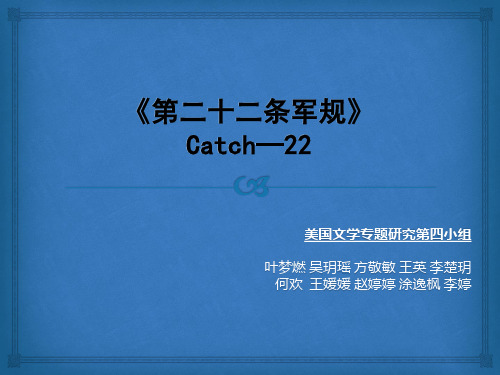
米洛头衔及所受待遇
巴勒莫的市长——也是附近卡里尼、 蒙雷阿莱、巴盖里亚、泰尔米尼— —伊梅雷赛、切法卢、米斯特雷塔 和尼科西亚诸市的市长——因为他 给西西里带来了苏格兰威士忌 在马耳他成为米洛·明德宾德爵士, 获皇家威尔士步枪团的少校军衔, 又被任命为马耳他的副总督,因为 他把鸡蛋的贸易做到了那里。
(2)渴望接纳的人生:自我意识的抹杀 总的看来,梅杰少校是《第二十二条军规》中悲剧的人物之一。他生来 平庸,长相酷似亨利·方达,从来不曾被正视过,好比活在别人的影子下。 他成就平庸,不知道如何做好一个军官,对约塞林的请求也是“无能为力”。 他更是被别人强加的平庸,他的名字,他的童年,他的求学,他的从军,都 是别人的认为,他没有了自我个性的彰显,更谈不上是一个反抗者,所以最 后他只能是一个逃遁者和隐士。(何欢)
“有些人天生平庸,有些人成就 平庸,还有些人被平庸强加于 身。”很不凑巧的是,梅杰少校 转变:规则的受害者→ 是三者兼备,即使在毫无特出之 制定者 处的人中间,他也终究比其他人 出众,因为他是最缺乏特出之处 的那位,但凡见过他的人,总是 为他给人印象之淡薄而印象深刻。
(1)从名字和长相说起 这个名字给梅杰少校带来的归属感由于他的真名被发现而转瞬逝去,从 此自我便离他而去, 梅杰变成了连自己都不认识的那个“他者”。 方达扮演尽职的军官Roberts,一心盼望着能离开这个安静的船只到前 线参战。但舰长是一个小肚鸡肠的人,以整人为乐趣,无论如何都不会在 Roberts的申请要求上签字。大概梅杰长相酷似那个一身正气想要参战的军 官,让一群拼命凑够飞行次数祈求遣返回国的士兵们抱有偏见吧。(王媛媛)
他在西西里一分钱一个买来鸡蛋, 但是他从不说自己在西西里买的鸡 蛋。再在马耳他悄悄地用四分五厘 卖出去(赚了三分五厘),他对外 宣称他是用七分钱买的鸡蛋,再在 军队食堂五分钱卖出去。
Catch 22
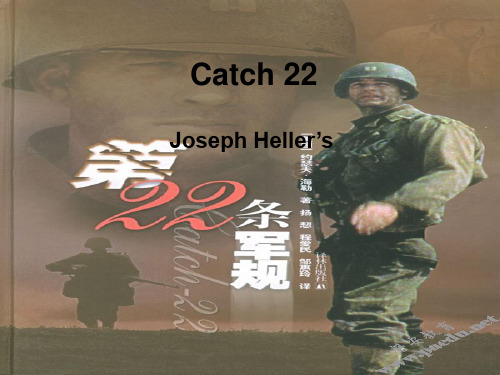
Joseph Heller’s
作者简介
• 约瑟夫· 海勒(1923—1999)美国黑色幽默派 及荒诞派代表作家,出生于纽约市布鲁克林一个 俄裔犹太人家庭。 • 第二次世界大战期间曾任空军中尉。战后进大 学学习,1948年毕业于纽约大学,获文学学士学 位。1949年在哥伦比亚大学获文学硕士学位后, 得到富布赖特研究基金赴英国牛津大学深造一年。 1950到1952年在宾夕法尼亚州立大学等校任教。 此后即离开学校,到《时代》和《展望》等杂志 编辑部任职。1961年,长篇小说《第二十二条军 规》问世,一举成名,当年即放弃职务,专门从 事写作。
• 那是个粗鲁的玩笑, 可是达尼卡大夫并没 有笑,直到约萨里安 又执行了一次任务之 后,再次来求他要求 停飞——尽管这没有 任何指望。达尼卡大 夫窃笑了一下,很快 又沉浸到他自己的麻 烦中去了,这包括怀 特· 哈夫特指挥官那天 早上一直在向他挑战, 要和他比印度式摔跤, 而约萨里安则恰恰在 彼时彼地决定要发疯。
二、come to 用于固定词组中, 达到 短语中名词所表明的情况
• 1. come to a conclusion / decision... 作出结论/ 决定 ⋯⋯ • 2. come to an agreement / understanding / terms.. 达 成一致/谅解/ 协议或和解⋯⋯ • 3. come to a(n)... end 有⋯⋯结果( 结局、下场) • 4. come to life 活跃起来 • 5. come to light 被发现, 被大家知道 • 6. come to nothing / no good 没有结果/成就 • 7. come to oneself 恢复知觉, 恢复正常 • 8. come to sb.’s attention / notice 受到某人注意 • 9. come to the point 谈正题, 谈主要问题 • Don’t talk all round the question; come to the point. • 别绕圈子, 言归正传吧!
第二十二条军规 (2)

Translation of the novel
CHAPTER 41 SNOWDEN. doc
Brief introduction to black humor
It is one of the most representative genres in the American literature in 1960s.It was usually used in literature, drama, and film, is a kind of absurd or morbid humor retaining a serious tone .The purpose of black humor is to express the absurdity, insensitivity, paradox, and cruelty of the modern world. Popular themes of the genre include murder, suicide, war, barbarism, drug abuse, terminal illness, domestic violence, insanity and so on. Besides, some comedians use it as a tool for exploring vulgar issues, thus provoking discomfort and serious thought as well as amusement in their audience.
The Characters in this Novel
The writer directly exposes every real aspect of American bureaucracy society after WWII by depicting those people in single of multiple dimensions. For example: Yossarian, a typical anti-heroic character of black humor, is the protagonist in Catch-22. Yossarian had a lot of heroic characteristics, for instance, he was very smart and knew the world literature very well. But most of his behaviors are regarded as immoral and coward He tried many ways to be proved that he is a insane so that he can be exempted from flying any mission. The canteen Minder Milo is a calculating entrepreneur. He engaged in speculation in the name of food purchasing. He even established a multinational corporation in this way. He smuggled goods through planes and even employed the enemy’s planes to transport for his company. What was more ridiculous is that he bombed his own airfield when the enemy-Germans offered him more profit. However, such a capitalist who ignored the soldiers’ lives, became an international celebrity.
英语论文On Black Humor in Catch-22
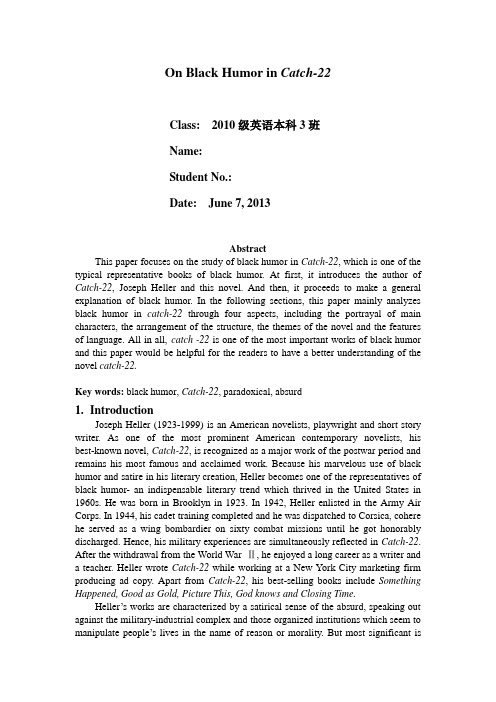
On Black Humor in Catch-22Class: 2010级英语本科3班Name:Student No.:Date: June 7, 2013AbstractThis paper focuses on the study of black humor in Catch-22, which is one of the typical representative books of black humor. At first, it introduces the author of Catch-22, Joseph Heller and this novel. And then, it proceeds to make a general explanation of black humor. In the following sections, this paper mainly analyzes black humor in catch-22through four aspects, including the portrayal of main characters, the arrangement of the structure, the themes of the novel and the features of language. All in all,catch -22 is one of the most important works of black humor and this paper would be helpful for the readers to have a better understanding of the novel catch-22.Key words: black humor, Catch-22, paradoxical, absurd1.IntroductionJoseph Heller (1923-1999) is an American novelists, playwright and short story writer. As one of the most prominent American contemporary novelists, his best-known novel, Catch-22, is recognized as a major work of the postwar period and remains his most famous and acclaimed work. Because his marvelous use of black humor and satire in his literary creation, Heller becomes one of the representatives of black humor- an indispensable literary trend which thrived in the United States in 1960s. He was born in Brooklyn in 1923. In 1942, Heller enlisted in the Army Air Corps. In 1944, his cadet training completed and he was dispatched to Corsica, cohere he served as a wing bombardier on sixty combat missions until he got honorably discharged. Hence, his military experiences are simultaneously reflected in Catch-22. After the withdrawal from the World War Ⅱ, he enjoyed a long career as a writer and a teacher. Heller wrote Catch-22 while working at a New York City marketing firm producing ad copy. Apart from Catch-22, his best-selling books include Something Happened, Good as Gold, Picture This, God knows and Closing Time.Heller’s works are characterized by a satirical sense of the absurd, speaking out against the military-industrial complex and those organized institutions which seem to manipulate people’s lives in the name of reason or morality. But most significant isHeller’s masterful employment of black humor. He is realistic about his skills: “I can be funn y—for one-half page at a time…I can be humorous in several ways—with irony, with dialogue, with farcical situations, and occasionally with a lucky epigram or an aphorism.Catch-22, as Joseph Heller’s masterpiece, tells the story of Captain Joseph Yossarian and his attempt to avoid serving in World WarⅡby feigning insanity. However, Yossarian is thwarted by the doctor’s argument that if he were truly mad then he would endanger his life and seek to fight more missions. On the other hand, if he were sane, then he would be capable of following orders to fight more missions. Catch-22, Heller’s typical work of black humor, is an anti-war fiction setting in WW Ⅱ.But its real theme is to expose the dehumanization of all contemporary institutions, the absurd and corrupted bureaucracy and the alienation of individuals existing in a systemized chaotic condition, such as war.2.Generation explanation of black humorBlack humor, which comes from a name of a book written by Bruce Jay Friedman, is an important literary term of America in 1960’s, and it refers primarily to a kind of bitter and often outrageous satire. Black humor can be defined as a combination of humor with resentment, gloom, anger and despair. It is a type of modern humor caused by anger. It combines absurdity with humor often describing horrible or sad events in language normally associated with pleasant or light-hearted occasions. Writers intend to provo ke readers’ response to the blackness of modern life as laughter, or, laughing in face of a tragedy. They generally do not laugh at their characters; in fact, they take them seriously. “But if they do laugh at some of them at times, it is because they feel amused at their attempt to try to create order in their disordere d and absurd world.” What occurs often is a sense of grief and pain coming through the laughter, a feeling of frustration and being bottled up. Therefore, black humor can be considered as the death humor out of despair and laughter out of tears.Theoretically, black humor was chiefly influenced by French philosopher and Sartre’s existentialism and Freudian theory of psychology. Writers deny the possibility of positive individual action by choosing a more pessimistic method in order to reflect the objectivity of life, the loss of faith and the deviation of humanity. Different from traditional literature creation, which trusts that goodness always triumphs over evilness, black humor uses a humorous tone with desperation to reveal the misery of reality. In such novels, ordinary characters or situations are usually exaggerated far beyond the limits of normal satire. The powerlessness of being manipulated by unjust fate makes characters laugh at the mselves. Feeling “humor” from “blackness” and challenging “blackness” with “humor”, these are the essence of black humor, and how those writers treat their world of fear, neurosis and absurdity.In contemporary literary criticism, black humor is a term applies to a large group of American novels beginning in the 1950s. Although the writers of black humor did not intentionally form a school of literary movement, in their novels, there is a common core which is directed against hypocrisy, racial prejudice, war, terrorism, and the dehumanization of individuals by the modern society. In conclusion, the research of black humor literature not only takes great effects on understandingCatch-22, but also has importance on literature studies and social critics.3.Analysis of black humor in Catch-223.1The portrayal of main charactersBeing the representative of the literature of black humor, the work contains tremendous styles of utterances and behaviors of various persons which circle the principle of “catch-22”. Yossarian, a typical anti-heroic character of black humor, is the protagonist in Catch-22. Critics say that Yossarian is an anti-hero because he does not risk his life to save others’. In a world where life is casually lost, it is more practical to redefine heroism as simple self-protection. The proposal of self-protection brings about an intense conflict for Yossarian. Even though he is determined to survive the barbaric war at all costs, he nonetheless cares for his battle companions and is traumatized by th eir deaths. His constant dread at Snowden’s death stems both from his compassion for Snowden and from his frightened realization his own body will collapse at the first blow. In the end, when he was offered a choice between his own security and the security of the entire squadron, Yossarian is unable to choose himself over others. This concern about others complicates the simple logic of self-preservation, and forms its own Catch-22 that is invisible in whole story: life is devalued with a moral concern for others’ lives, but a moral concern for others’ lives endangers one’s own life. Heller creates a trap of morality for Yossarian, it seems that Yossarian has no other choice but struck in desperation. Nevertheless, he ultimately escapes this conundrum by literally walking away from the war—a determination that refuses both the opportunity of becoming an officer who avoid perils at the expense of his army and that of remaining a normal soldier who endangers himself for absurd reasons.Another character is indispensable to mention about is Milo Minderbinder, who is one of the most complex figures in the novel, and the syndicate he managers is one of its most elusive symbols. “He is a symbol of a system that lies at the bottom of all the absurdity: the capitalist free enterprise, portrayed as immoral and a menace to human survival.” In one way, he tem pts the innocent with chocolate-covered cotton and promise of a fast wealth; in the other way, he is personification of death who should fail to offer the urgent med ication when Snowden is dying. Milo’s hypocritical and mercenary nature is totally unveiled. Milo is a crusader against the arbitrary regulations of the military bureaucracy in one sense, while he certainly represents an individual’s triumph in the face of a dehumanizing organization, even he also lacks morals and consideration for others. For gaining his wealth and power, he has become like the authoritarian forces he used to defy, sacrificing real value for personal achievements.What is more, there are a lot of other distinctive characters, for instance, the “soldier in white” who was encases from head to toe in plaster and gauze and the dubious Texan who is the only one talking with the “soldier in white”. Major Majormajor, whose tragedy in life is that he resembles a movie star, Henry Fonda and only allows people to visit him when he is absent there. Orr, who talks with crab apples and chestnuts in his mouth, is beaten up by a whore in Rome to pretend that heis already insane. And the chaplain fakes an ailment and checks into the hospital after he was accused of unspecified crimes.3.2The arrangement of the structureThe novel was narrated in third person but most of events are reflected through Yossarian’s point of view, the whole story reads like a n ightmare reminiscing about the past. The notion of time is affected by the absurdity governing characters’ lives. The story is told with jumbled chronology involving recollection, allusions to future, and statements whose meanings become clear only as the novel progresses. The narrative skips from scene to scene with occasional mentions of “before” and “after” but with no central “now” to give these events meaning. However, a number of clues are offered to enable readers to put events in a special order: th e expansion of Milo’s syndicate, the ranks of certain officers, and the number of missions soldiers are forced to fly, etc.On the absurd, chaotic stage of war, Heller’s ultimate purpose is not to describe a bloody war, but to display the ugly dislocation of American society. The characters in Catch-22 have no absolute death or live existence. Time is absent; life loses its timely order. Everything was wrapped up in chaos and readers are thrown back to the beginning of the events. Heller’s formlessness is a n attractive technical innovation that is observed by Harris and many other critics, “Heller writes in a way that deliberately confounds the notion of coherent time and seeks to thwart any attempt to impose a chronological order on the events of the novel.”Free out of regular chronological order, the mastery of entire organization from a higher viewpoint achieves the uniqueness of Catch-22.3.3The themes of the novelThe main theme of Catch-22 is the absolute power of bureaucracy, which is one of the most terrifying aspects of Catch-22. The lives and deaths of the men in Yossarian's squadron are governed not by their own decisions concerning dangerous risks but by the decisions of an impersonal, frightening bureaucracy. And the bureaucrats are absolutely deaf to any attempts that the men make to reason with them logically; they defy logic at every turn. Doc Daneeka, for example, won't ground Yossarian for insanity because Yossarian's desire to be grounded reveals that he must be sane, and the Major, will see people in his office only when he is not there.In these and other instances, Yossarian and his companions learn that what they do and say has very little effect on what happens to them. All they can do is learn to navigate their way through the bureaucracy, using its illogical rules to their own advantage whenever possible.And also, there are other themes reflected in Catch-22, such as the loss of religious faith, the importance of language, the inevitability of death, and some themes in words, like confusion, greed, and guilt.For example, from the themes of confusion and greed, as well as the men's experiences with the idea of catch-22, it is quite plain to see that men with power will keep power and those without power will suffer the consequences. As a familiar quote says, "Absolute power corrupts absolutely." Yossarian learns the hard way that men with power have a tendency to abuse their authority.3.4The features of languageHeller abandons traditional writing method. He adopts a new way to write Catch-22. He makes the words, phrases, and even the whole sentence in disorder resulting in people’s realizing the crazy and morbidity of the whole society. This is the feature of black humor.There are plenty of repeating, dubious and paradoxical words, phrases, and dialogues. E.g. Doe Daneeka was Yossarian’s friend and would do just about nothing in his power to help him. “My only fault”, he observed with practiced good humor watching for the effect of his words, “is that I have no faults?” (Chapter 29) Generally speaking, the traditional novelists try to make their novels clear. Dubious is not allowed; while Heller just uses such sentences to let the people know the absurdity and irrationality of the world. We feel difficult to understand the logic order of this sentence, let alone the meaning. These sentences are to explain but make us more and more confused. E.g. McWatt wore fleecy bedroom slippers with his red pajamas and slept between freshly pressed colored bed sheets like the one Milo had retrieved half of for him from the grinning thief with the sweet tooth in exchange for none of the pitted dates Milo had borrowed from Yossarian. (Chapter7)4.ConclusionCatch-22, as Joseph Heller’s masterpiece, is one of typical representatives of black humor. This paper mainly has a general introduction of the novel and the author, Joseph Heller, and also explains the black humor briefly. Besides, the paper proceeds to discuss the black humor reflected in Catch-22 through four aspects: the portrayal of main characters, the arrangement of the structure, the themes of the novel and the features of language. In a word, catch -22 is one of the most important works of black humor and this paper is just a brief analysis on Catch-22and black humor, which would help us understand the novel better, but more and deeper researches are also necessary to be done.BibliographyHeller, Joseph. Catch-22 [M]. New York: Dell Pubkishing Co., Inc, 1961. Dickstein, Morris. Ed. “Black Humor and History: The Early Sixties”. Gates of Eden: American Culture in the Sixties [M]. Boston: Harvard University Press, 1997. Kiley, Frederick, and Walter McDonald. Ed. “An Impolite Interview with Joseph Heller”. A Catch-22 Casebook [M]. Thomas Y. Crowell Company, Inc, 1973. Nagel, James. Ed. Critical Essays on Joseph Heller [C]. Bostoon: G. K. Hall, 1984.陈永国. 20世纪文学泰斗—海勒[M]. 四川:四川人民出版社, 2001.杨乐芳. 黑色幽默的精彩演绎-论《第二十二条军规》的艺术特色[J]. 齐齐哈尔:齐齐哈尔师范高等专科学校学报,2009,(4)常文革,张芮. 黑色幽默的典范—约瑟夫. 海勒的《第二十二条军规》[J].长春师范学院学报,2005,(15).曹曼. 美国文学教程[M].武汉:武汉大学出版社,2007.。
Catch-22 第二十二条军规
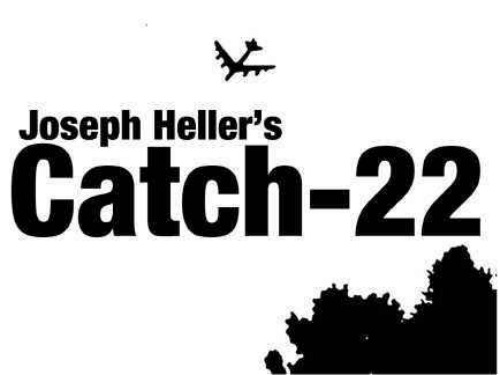
Catch-22
1. Madman may not perform flight duties must submit an application. 2. Pilots can return home after finishing 25 flights, but they have to obey orders.
Antinomy Absurd
Panic about war Criticism of the bureaucracy
In text
1. “But I’ve never had a chance to operate before. Which one is the scalpel? Is this one the scalpel?”(P312)
A synthesis of iction The fatuity and cruelty of the ruling class
“This is his pancreas, you…Shall I wash my hands first?”(P314) The absurdity and craziness of doctor Doctor’s numbness to death
2. “The raw muscles inside twitched like live hamburger meat.”(P318) Here was God’s plenty…that day for lunch.(P320) miserable and humorous Anger at war the cruelty of war
Black humor in characterization
1. Yossarian • A warrior with patriotism and sense of justice
catch22

Catch-22 (l ogic)A Catch-22, coined by Joseph Heller in his novel Catch-22, is a logical paradox arising from a situation in which an individual needs something that can only be acquired by not being in that very situation; therefore, the acquisition of this thing becomes logically impossible. Catch-22s are often spoken with regard to rules, regulations, procedures, or situations in which one has knowledge of being or becoming a victim but has no control over it occurring.The archetypal Catch-22, as formulated by Heller, involves the case of John Yossarian, a U.S. Army Air Forces bombardier, who wishes to be grounded from combat flight evaluated by the squadron's flight surgeon and then found "unfit to fly." ("Unfit" would be any pilot who is actually willing to fly such dangerous missions: as one would have to be mad to want to take on such missions.) But the problem is that to be declared unfit, he must first ask for an evaluation, which is considered as a sufficient proof for being declared sane. These conditions make it impossible to be declared unfit.The "Catch-22" is that "anyone who wants to get out of combat duty, isn't really crazy"[1] Hence, pilots who request a mental fitness evaluation are sane, and therefore must fly in combat. At the same time, if an evaluation is not requested by the pilot, he will never receive one (i.e. they can never be found "insane"), meaning he must also fly in combat.Joseph Heller invented the term catch-22 in his novel of the same name. The story is about about World War II soldiers who encounter frustrating situations. For instance, any soldier who is a crazy doesn’t have to fight. All you have to do is ask. But if you’re sane enough to ask, you’re considered sane enough to fight.More often than not, a catch-22 refers to a situation in which it’s impossible to get the things without having them. Applying for jobs can be a catch-22. You can’t get a job without experience, but you can’t get experience without getting a job.Therefore, Catch-22 ensures that no pilot can ever be grounded for being insane—even if he were.Real-life examplesExamples of Catch-22 can be found in real life, although none are as hopeless as situations found in the novel. Common examples include the following:∙One cannot get a job in a high-profile occupation without prior experience, but one cannot get experience without getting a job in a high-profile area.∙Until vendors develop applications for Linux, Linux's market share on the desktop will stagnate. But until the market share of Linux on the desktop rises, no vendor will develop applications for Linux.[2]∙One is unlikely to purchase a hydrogen-fueled vehicle without there being a network of hydrogen stations from which to fill up. However, creating a network of hydrogen stations is not viable until there are enough hydrogen vehicles to create the demand.∙Americans in both the living room and the boardroom are growing more fearful about the economy,creating a Catch-22 for the job market: Shoppers will not spend until they feel more secure (as in, being employed), and businesses will not hire until people start spending.∙ A sports team needs good players to be good; but good sports players will not play on a team unless it is good.∙To hike the Appalachian trail you need a job to pay for it, but to hike it you cannot get time off from your job∙ A school doesn't have a bike rack but will get one if students ride their bikes to school, but the students don't ride their bikes to school because there is no bike rack.∙List of paradoxesSituations which have logical similarities to a Catch-22.∙Circular logic∙False dilemma∙Irony∙No-win situation– real choices exist, but no choice leads to success.∙Kobayashi Maru– a scenario involving a choice between death of civilians or of the officers who try to save them.∙Reductio ad absurdum∙The Lady, or the Tiger?–a short story involving a princess who must make a decision in a no-win situation.∙Chicken or the egg– a seemingly unbreakable cycle of causation, which has an unknown origin.∙Cornelian dilemma– a choice between actions which will all have a detrimental effect on the chooser or on someone they care for.∙Deadlock– in computing, when two processes reach a standstill or impasse, each waiting for the other to finish.∙Double bind– a forced choice between two logically conflicting demands.∙Hobson's choice– the choice between taking an option and not taking it.∙Lesser of two evils principle– a choice between two undesirable outcomes.∙Necessary Evil– anything which, despite being considered to have undesirable qualities, is preferable to its absence or alternative.∙Morton's Fork– a choice between two equally unpleasant alternatives.∙Paradox–a statement or group of statements that leads to a contradiction or a situation which defies intuition.∙Game of Chicken– Two participants desire a positive outcome by taking an action, yet if taken by both the result is devastatingly negative.∙Sophie's Choice–a choice between two equally beloved entities, one of which must be destroyed to preserve the existence of the other.∙The Trial– a novel by Franz Kafka.The Captain of Köpenick。
catch-22美国文学选读
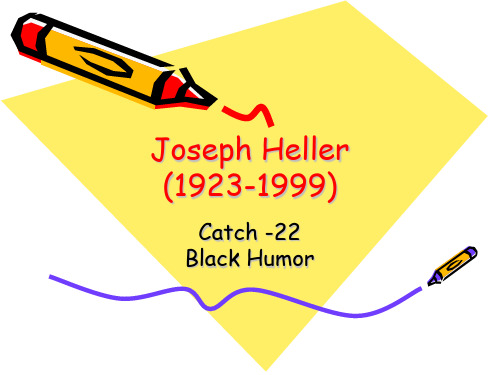
Catch -22 Black Humor
Definition of the term
• It used to be a military term
• Because of Joseph Heller’s Catch-22, it has
become an English idiom.
Its effects
• Through extreme irony and exaggeration, the writer may express his/her strong hatred and contempt to cruel reality.
• Showing writer’s (narrator) anguish and pain
• Guilt-- The death of Snowden plagues Yossarian throughout the war.
Key issues of the novel
• Confusion --- Catch-22; the war itself
• Greed --- Cathcart’s greed for power; Milo’s greed for money
• Ordinary characters or situations are usually exaggerated far beyond the limits of normal satire or irony.
• Black humor uses devices often associated with tragedy and is sometimes equated with tragic farce.
- 1、下载文档前请自行甄别文档内容的完整性,平台不提供额外的编辑、内容补充、找答案等附加服务。
- 2、"仅部分预览"的文档,不可在线预览部分如存在完整性等问题,可反馈申请退款(可完整预览的文档不适用该条件!)。
- 3、如文档侵犯您的权益,请联系客服反馈,我们会尽快为您处理(人工客服工作时间:9:00-18:30)。
Analysis of the text
• General Setting:in an American army camp on the island of Pianosa, Rome during World War Ⅱ.
• Minor setting: yossarian remembered Snowden’s death when he (Yossarian) was wounded.
• Orr- shares tent with Yossarian, practices crashing every mission- eventually crashes and escapes.
• Nately – a soldier who had a love affair with a girl before his death. Yossarian broke the news of Nately’s death to her. In violent rage, she tried to kll him. Because of this, Yossarian was wounded( beginning of chapter41).
The theme
• Pity - The reader has pity for each soldier every time he is afraid to go on a mission.
• Reality- Each soldier has to face the fact that there is a chance that he may never come down from a mission alive.
Brief summary
• The novel tells a story of a pilot soldier Yossarian in WWⅡ. His task is to accomplish a certain number of flying missions. But his superior keeps raising the number using one military rule Catch22. it mainly describes every effort the protagonist Yossarian has made for his escape from the Catch-22 and ultimately from the war.
• Milo Minderbinder- mess officer; leader of the syndicate (black market/underground business dealings); willdo anything for a profit, even bomb his own squadron.
• Antagonist
• Cathcart:
• colonel that desperately wanted to be a general; unsure of himself, want to impress his superiorwhich is why he keeps raising the number of the missions
Minor characters
• Snowden- soldier who dies in Yossarian's plane; while Yossarian was treating him for minor leg wounds, Snowden was dying of fatal chest wounds- Yossarian feels guilty because if he had known about the real problem, he thinks he could have saved Snowden's life(chapter41).
• Chapter41: he was wounded and then treated by two fake doctors. When the “treatment” was over, he was told his superior was going to make him a “hero, and this acknowledgement let him remember his comrade Snowden’s death.
Main Characters源自• Protagonist
• Yossarian:
• paranoid, thinks everyone is trying to kill him( which is true); thinks everyone is crazy; feels guilty about the death of Snowden, which changes his view of war.
• Definition: an impossible situation; one in which the solution or success depends on mutually dependent factors: A depends on B; B, in turn, is dependent on A; so it is an interlocking situation in which there is no way out.
Joseph Heller (1923-1999)
Catch -22 Black Humor
Definition of the term
• It used to be a military term
• Because of Joseph Heller’s Catch-22, it has
become an English idiom.
